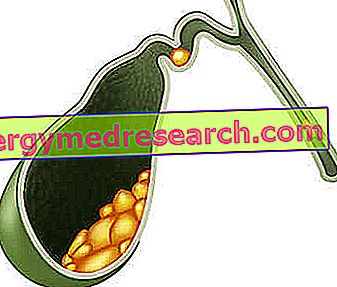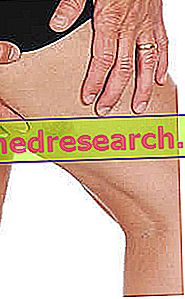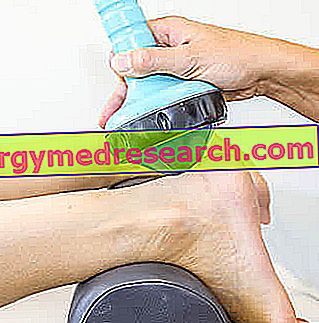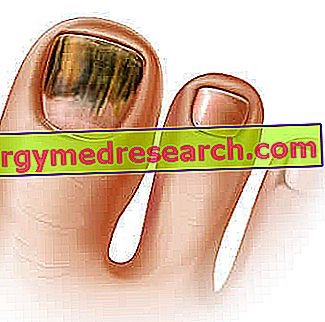Gallstones (lithiasis or calculosis) are solid aggregations (almost always cholesterol) that form in the gall bladder.
Also called gallbladder, the gallbladder is the organ necessary for the storage of bile (digestive fluid secreted by the liver).

When the balance of this suspension is compromised, some components precipitate, aggregate and cause calculations.
Gallstones can cause: biliary colic, acute cholecystitis (inflammation), chronic (with thickening of tissues, liquid etc.) and other serious complications.
They affect 10-15% of the population but are often asymptomatic (60-80%).
Biliary colic manifests as: strong pain in the upper part of the abdomen irradiated under the scapula, nausea and vomiting.
NB . Biliary colic and cholecystitis are not synonymous. In fact, in some cases (<5%) the cholecystitis are alitiasic (independent of the calculations).
What to do
- Preventively intervene on behavioral risk factors:
- Maintain a normal weight.
- Respect nutritional balance.
- Avoid or cure predisposing metabolic disorders; for example:
- Hypercholesterolemia.
- Hypertriglyceridemia.
- Type 2 diabetes mellitus.
- Avoid the contraceptive pill.
- In case of obvious symptoms, it is necessary to consult a doctor or a specialist for a specific diagnosis.
- Abdominal ultrasound is usually sufficient; if it is negative and the symptoms remain, proceed with other tests such as:
- Endoscopic retrograde cholangiography.
- Percutaneous cholangioscopy.
- MRI-cholangiography.
- Follow any medication prescribed by your doctor.
- In the case in which gallstones cause serious disturbances or reach annoying dimensions, the only solution is surgical removal of the gall bladder.
What NOT to do
- Become and remain obese for a long time.
- Dealing with long periods of fasting or under-nutrition; also avoid losing weight too quickly.
- Follow an unbalanced and hypolipid diet.
- Drink a little water, eat dry food and stay dehydrated (alcohol abuse contributes to this).
- Keep high the parameters of: cholesterolemia, triglyceridemia and glycaemia.
- Take the contraceptive pill.
- Take the medication prescribed against gallstones with irregularity.
These precautions must be avoided especially in the presence of one or more risk factors such as:
- Familiarity.
- Age> 40 years.
- Female sex.
- Multiple pregnancies.
- Scandinavian or Native American breed.
- Suffering from hemolytic anemia.
- Suffer from chronic bowel diseases (Crohn's disease, Rectum-Ulcerative Colitis).
What to eat
As anticipated, diet is a determining factor; it is advisable to prefer:
- Foods of animal origin with little cholesterol and a medium-low amount of fatty acids: fish, lean meats, semi-skimmed or skimmed milk, lean ricotta, lean fresh cheeses, egg whites.
- Condiments based on vegetable oil, preferably cold pressed (rich in phytosterols and vitamin E), even in good quantities. They improve digestion, do not affect the expulsion of bile and are beneficial for the metabolism.
- Foods rich in polyunsaturated and monounsaturated fats: omega 3, omega 6 and omega 9 reduce cholesterol levels, triglyceridemia and moderate the complications of type 2 diabetes mellitus. They are rich: blue fish, algae, oily seeds or fruits and related oils extraction.
- Products rich in fiber, with a low or moderate glycemic index: they reduce the absorption / reabsorption of dietary cholesterol and bile; in addition, they keep blood sugar at normal levels. Whole grains, low-calorie and low-sweet fruit, legumes, vegetables and oilseeds.
- Hydrated foods; it is advisable to drink plenty of water.
What NOT to Eat
- Fried, creamy desserts, condiments of animal or hydrogenated origin: poor in good lipids, phytosterols, fat-soluble vitamins and rich in bad fatty acids.
- Foods rich in hydrogenated and trans fats: they do not have a direct effect on gallstones but negatively affect cholesterolemia and cardiovascular risk; moreover their consumption implies a reduction of good fats (if we want to maintain the principle of nutritional balance with 25-30% of lipids in the diet). They are contained above all in salty snacks and industrial desserts.
- Foods of animal origin too rich in cholesterol and fats, above all saturated: cream, butter, fatty and / or seasoned cheeses, cuts of fatty meat (bacon, lard, coppone, ribs, etc.), fatty salamis and above all sausages, offal, yolk of 'egg (controversial), crustaceans and certain molluscs.
- Refined products, sugary, with few fibers and high glycemic index: white bread, desserts etc.
- Many alcoholic drinks.
Natural Cures and Remedies
It is believed that some natural products can have a preventive effect on the formation of gallstones.
Certain herbs and foods act:
- Increasing bile production.
- Improving the peristaltic contractions of the gall bladder and favoring its emptying (preventing the deposit).
- Reducing the absorption / reabsorption of cholesterol and bile in the intestine.
Some of these medicinal plants are:
- Milk thistle.
- Artichoke.
- Enula.
- Fennel.
- Aubergine.
- Borage.
- Peppermint.
- Absinthe.
- Oats.
- Cherry.
- Onion.
- Strawberry.
- Lemon.
- Grapes.
- Rhubarb.
- Boldo.
- Aloe.
- Chicory.
- Rosemary.
- Dandelion (controversial).
Pharmacological care
There are two types of pharmacological remedies against gallstones:
- Against some responsible risk factors.
- Painkillers and relaxants for the gallbladder.
- Specific to rebalance the composition of bile by stabilizing it:
- Ursodeoxycholic acid or ursodiol (eg Ursobil HT, Ursodes AGE acid, Litursol): they tend to dissolve small and transparent stones.
- Terpenes: make bile more soluble.
- Chenodeoxycholic acid: tends to dissolve stones.
- Thiazide diuretics (eg hydrochlorothiazide: eg Moduretic, Esidrex): useful against calcium aggregations.
Prevention
Prevention of gallstones requires:
- Consciousness of independent risk factors (familiarity, sex, age, race, other diseases, etc.).
- Reduction of risk factors that depend on lifestyle and diet (overweight, metabolic diseases, fasting, nutritional imbalance, birth control pills, etc.).
- Taking the prescribed drug therapy.
Medical treatments
The only alternative medical remedy against gallstones is surgery. This can be done in two ways:
- Traditional cholecystectomy: invasive; provides a significant surgical cut but has a very high success rate.
- Videolaparosurgery: minimally invasive; the cuts are small but it is limited when the gall bladder is hidden. In this case, the traditional method is used.



